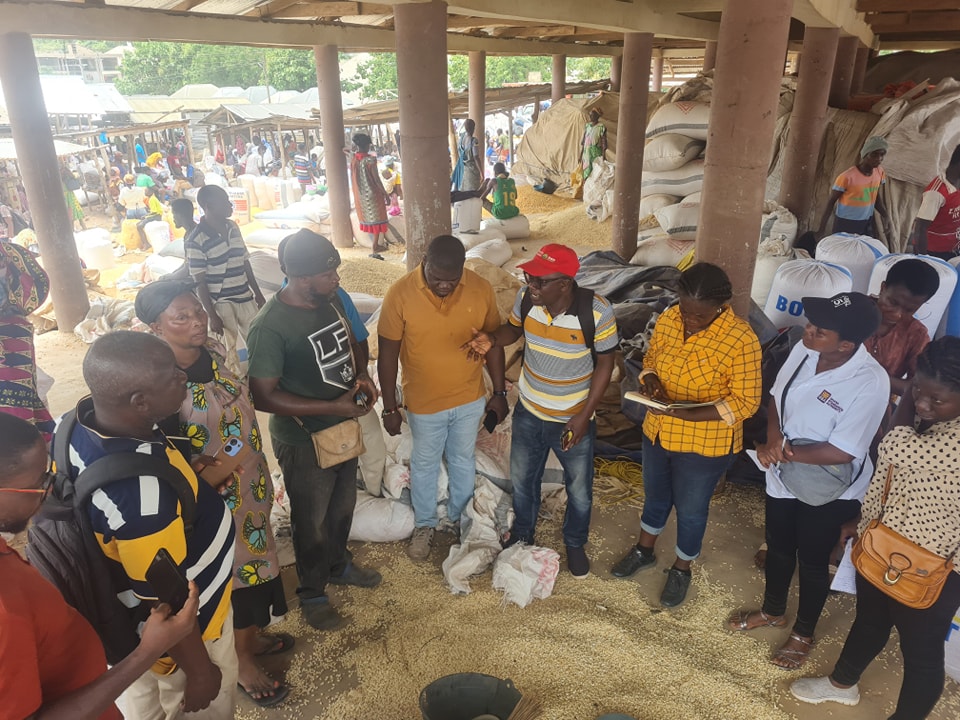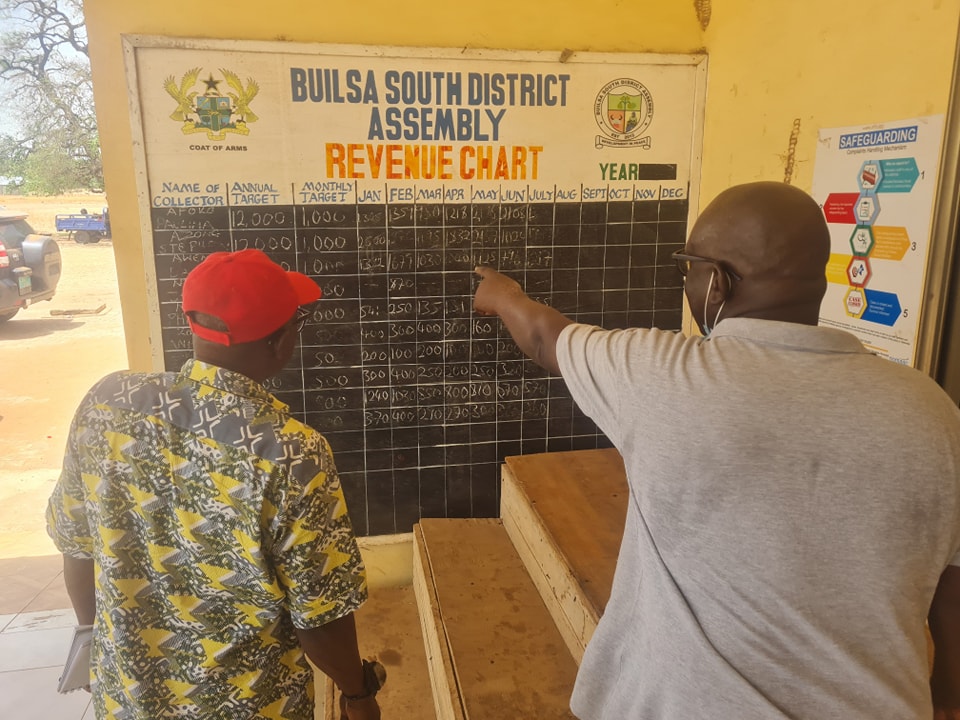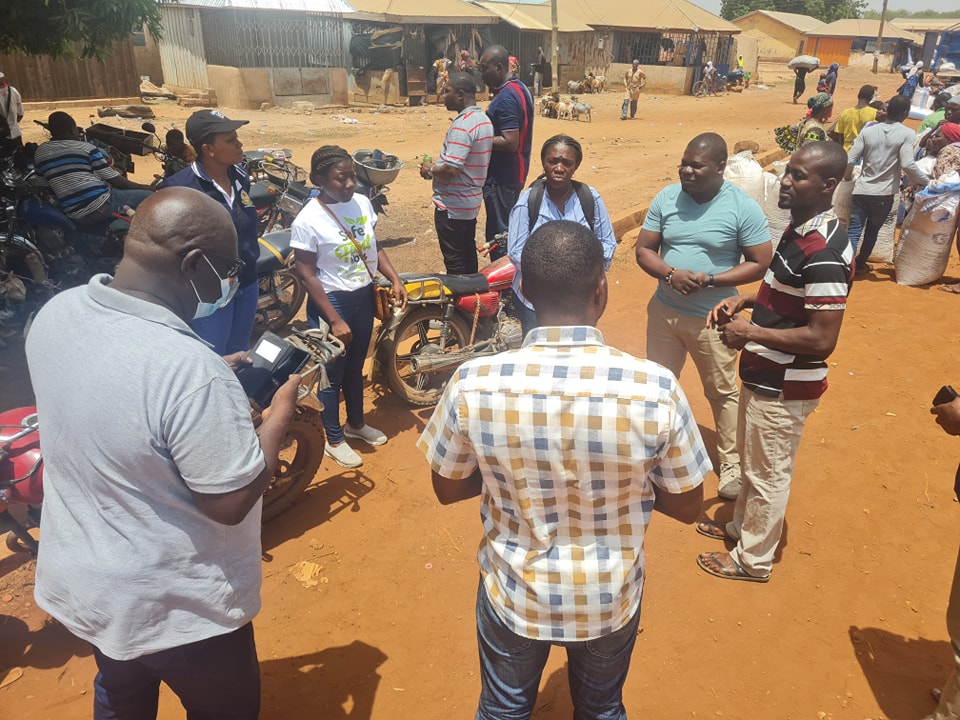FSRP ASSESSES FOUR MARKETS FOR REFURBISHMENT
A team of officials led by the West Africa Food System Resilience Programme (FSRP) has toured four markets in the Northern, Middle and Southern belts of Ghana, to assess their viability as centers for cross-border trade of agricultural produce in the West African sub-region.
The team, which was made up of senior representatives from regulatory and policy implementation institutions including the Agric Engineering Services Directorate (AESD), the Plant Protection Services Directorate (PPRSD) of Ministry of Food & Agriculture (MoFA), Ghana Standards Authority (GSA) and the Food and Drugs Authority (FDA), interacted with market women, District Assembly authorities and District Directors of Agriculture where these markets are located. The markets assessed by the team are the Fumbisi market in the Northern Region, Abofour and Agogo markets in the Ashanti Region and Denu market in the Volta Region.
For each of the markets, the assessment exercise evaluated Market Infrastructure; Market Management; viability for Regional Trade & Marketing; Security & Disaster Management systems; Food Handling, Food Safety & Quality Controls; and Welfare arrangements.
FSRP aims at supporting key value chain activities through implementation of relevant interventions to increase preparedness against food insecurity and build resilience of agri-food systems in West Africa. In Ghana, the project’s priority value chains are Rice, Maize, Soyabean and Poultry (with emphasis on broiler production). One of the key interventions of FSRP, referred to as Component 3, focuses on the promotion of regional trade as part of measures to ensure food safety and resilience among member nations. Farmers and traders in the sub-region conduct cross-border trade of agricultural commodities in substantial quantities, but this is fraught with several challenges that inhibit free flow of trade. The purpose of this activity is therefore to facilitate trade and easy movement of agricultural commodities between Ghana and its neighbouring countries at these major market centers.
MARKET INFRASTRUCTURE
On the assessment of Market Infrastructure, the team took into consideration, the sizes of the markets, land ownership, spacial planning and space allocations; the condition of lorry parks, loading and off-loading curbs or platforms, public washrooms, drainage systems, the state of roads to and from the markets, and notable infrastructural lapses.
MARKET MANAGEMENT
For the assessment of Market Management systems, they evaluated market administration, local administrative oversight, average market population, designated market days, general market cleanliness, daily cleaning activities and sanitation/waste management systems.
CROSS-BORDER-TRADE
The viability of the markets for cross-border trading of major commodities, with particular focus on the FSRP value chain produce was critically assessed. Imported and exported commodities, their volumes and financial values of were appraised.
FOOD HANDLING, FOOD SAFETY AND QUALITY CONTROLS
Food Handling, Safety and Quality Controls within the markets were also of critical concern to the assessment officials vis-a-vis the mode of food transportation, the availability of warehouse or storage facilities, rice mills, designated drying floors, food packaging facilities, and the existence of quality checks/tests facilities.
SECURITY & DISASTER MANAGEMENT
The team also examined the Security & Disaster Management status of each market facility. These included recurrent and potential disaster(s), the presence or proximity of fire stations or hydrants; emergency coordination protocols or arrangements; the prevalence of crime, internal security arrangements, presence or proximity of police stations, posts or barriers.

GENERAL WELFARE
In line with standard FSRP requirements, the team assessed each markets’ attention to the wellbeing of market users in terms of healthcare, welfare and hygiene. The presence of health posts, sick bays, or first aid facilities were investigated, in addition to the availability of creches or day care centers at the market premises; along with the proximity to primary schools, and necessary arrangements to discourage the prevalence or potential for child labour practices.
The members of the team were: Mr. Allswell Okai (Agriculture Economist, FSRP), Mr. Bloomfield Crosby Attipoe (Infrastructure Engineer, FSRP), Mr. E. Ankrah (Communications & Knowledge Management Specialist, FSRP), Mr. Adu Nyarko Andorful (Social Risk Specialist, FSRP), Mrs Margaret Davids Opoku Agyeman (Agribusiness Officer, FSRP). Ms. Comfort Essumang (Principal Scientific Officer, GSA), Ms Jennifer Quartey (Regulatory Officer, FDA), , Mr. Peter Ketting (Dep. Director, MOFA-PPRSD), Mr. Eric Commey (Agric Engineer, MoFA-AESD).
The four markets were selected for assessment following broad consultations with Regional and District Directors of Agriculture, as centers for the promotion of trade of FSRP’s value chain commodities – Rice, Maize and Soyabeans. If found viable, FSRP would carry out rehabilitation and upgrade works, to better position them as centers for the expansion of agricultural trade in the region.
The results of the assessment exercise are to be presented to the Project Implementation Unit of FSRP, the Ministry of Food & Agriculture and the World Bank, for further review.
The West African Food System Resilience Programme (FSRP) is a World Bank and Government of Ghana program, coordinated by the Economic Community of West African States (ECOWAS). It is to strengthen food system risk management, improve the sustainability of the agricultural productive base in targeted areas, and to harmonize agricultural markets in the West African sub region. It is to roll out a combination of adaptive, innovative and technological interventions in agricultural practice that will equip vulnerable households, families, communities, farmers and food systems in West Africa, to enable them withstand uncertainty and the risk of shocks in food production and distribution. Phase One of the programme covers Burkina Faso, Mali, Niger, and Togo, whiles Phase Two covers Chad, Ghana, and Sierra Leone. The programme is being implemented in Ghana through the Ministry of Food and Agriculture.

Fumbisi, Abofour, Agogo, Denu.
April 16-20, 2024.


Leave a comment
Comments (0)
No comments yet. Be the first to comment!